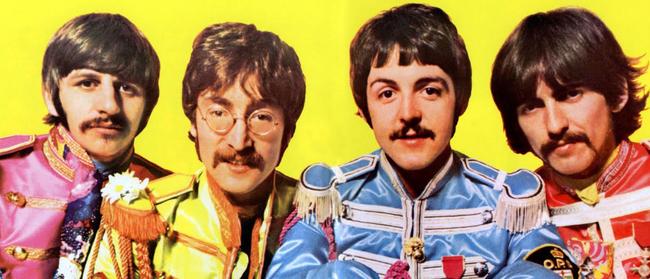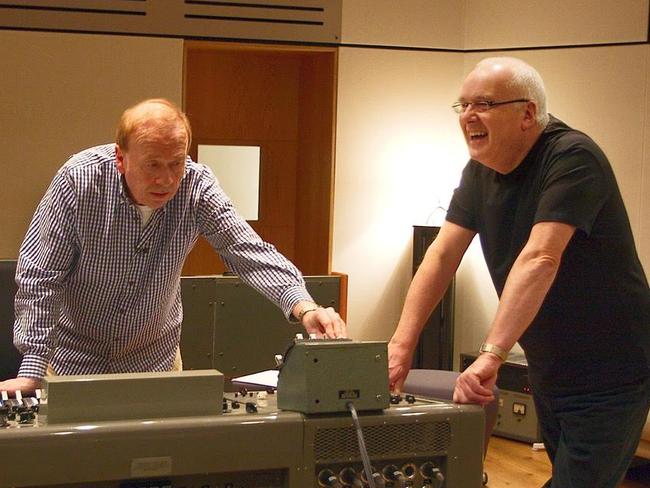Geoff Emerick, The Beatles’ sound engineer for Sgt Peppers and Revolver dies aged 72
THE trailblazing sound engineer behind some of The Beatles’ greatest moments, Geoff Emerick, as died at the age of 72.
Entertainment
Don't miss out on the headlines from Entertainment. Followed categories will be added to My News.
GEOFF Emerick, the sound engineer who helped The Beatles push the boundaries of music, has died of a heart attack at the age of 72.
Emerick was legendary Fab Four producer George Martin’s right-hand man at the famous Abbey Road studios in London and was instrumental in creating the sounds that would define Sgt Pepper’s Lonely Hearts Club Band, arguably the most important album in the rock music canon.
Martin’s son Giles, who has remastered The Beatles classics in recent years, including Sgt Peppers, tweeted that Emerick was “one of finest and most innovative engineers to have graced a recording studio”.
“I grew up with him as he worked so much with my father. We have all been touched by the sounds he helped create on the greatest music ever recorded,” he said.
GILES MARTIN REMIXES SGT PEPPERS FOR 50th ANNIVERSARY
50 THINGS YOU NEVER KNEW ABOUT SGT PEPPERS
THE MOMENT PAUL MCCARTNEY ‘SAW GOD’
Emerick joined the record label EMI when he was 15, around the same time as the four largely unknown lads from Liverpool had come in to cut the early singles that would set them on the path to being the biggest band in history.
Emerick worked his way through the strict Abbey Road hierarchy quickly and thanks to his inventive approach, work ethic and relationship with Martin was appointed chief engineer for The Beatles previous album, Revolver.

He was an integral part Sgt Peppers, which Rolling Stone magazine ranked No.1 in its list of the 500 Greatest Albums of All Time, and told the Herald Sun last year before its 50th anniversary re-release that he knew from the very beginning that he was going to have his work cut out for him.
“John (Lennon) just said that for the next album they were just going to concentrate on sounds and make different sounding songs because they were never, ever going to perform again,” Emerick said.
“And George Martin was open-mouthed because every band performed and John said they were going to create stuff on these records that no one has ever heard before. And then everyone looked at me.”
Emerick was just 20 years old when he worked on The Beatles’ 1967 masterpiece, for which he would later win a Grammy.
His rapid rise and willingness to push the boundaries of what was considered acceptable at the time — radical microphone placements, stuffing drums with sweaters, pushing equipment to its limits — put plenty of noses of joint within the company, but it was exactly what Martin knew The Beatles would need for their ever more ambitious projects.
“George and I had the same sense of humour so we could observe a situation and look at each other and there would be a wry sort of smile,” Emerick said.
“Later on when we were working together and he was producing and I was engineering, people would say ‘you and George don’t say much do you’. And we didn’t have to — he could read my mind and I could read his mind. It was an odd connection really.”

The first track Emerick worked on for The Beatles as chief engineer was a baptism of fire. Tomorrow Never Knows, the final track from Revolver was the most ambitious song they had attempted to that time and Lennon’s brief was that he “wanted his voice to sound like the Dalai Lama singing on a mountaintop 25 miles away from the studio”.
Nevertheless it gave Emerick a good insight into how the band worked. None of them were especially technically minded or interested in being hands on in the studio, but had a very clear idea of the sounds they wanted.
“They would say things like ‘I know I want to use piano — but I don’t want it to sound like a piano. I want to use this guitar but I don’t want it to sound like a guitar’,” Emerick said. “That was normally the direction — do what you like with it. No one else was recording the way we were then — we were experimenting and trying different ways of recording. Very close mic-ing with condenser mics to keep these colours and tonalities.”
The band took things to an entirely new level on Sgt. Pepper’s, from the trippy meanderings of Strawberry Fields Forever (which ended up being released as a single and not included on the album), to the circus swirl of Being For the Benefit Of Mr Kite and of course the epic A Day In the Life, the climax of which Martin later described as “an orchestral orgasm”.
Emerick was instrumental in all of them.

For Strawberry Fields he was responsible for seamlessly editing together two takes recorded weeks apart at different speeds and in different keys.
To fulfil John’s instruction on Mr Kite of wanting to “smell the saw dust on the floor”, he cut recordings of a fairground organ in to small sections of tape, threw them up in the air and reassembled them at random.
Emerick continued to work with The Beatles on the White Album — but left midway through the recordings.
“They were not very nice people to be with,” he said. “There was a certain anger there. I’d worked on about 11 or 12 of the songs and saw it all gradually falling apart.”
He was coaxed back for their triumphant swan song, Abbey Road, for which he won another Grammy. He scored a third Grammy in 1973 for his work on Band On the Run, by Paul McCartney’s post-Beatles band, Wings, and was awarded a Technical Grammy Award in 2004.
He also worked on albums by Elvis Costello, Supertramp, Art Garfunkel, Split Enz and America.
But he’ll always be most remembered for his cutting edge work with the greatest band of all time. Speaking last year, he said he thought we will never see the likes of The Beatles again.
“If we do it will be in another 200 years’ time,” he said. “Their music is like Mozart — he was the rebel of his day and his music was pop music. I know now when you see orchestras or other bands — not necessarily silly Beatle cover bands dressed like Beatles with little Beatle wigs on — but good musicians and singers, it’s like a new performance of their music.”
Originally published as Geoff Emerick, The Beatles’ sound engineer for Sgt Peppers and Revolver dies aged 72


